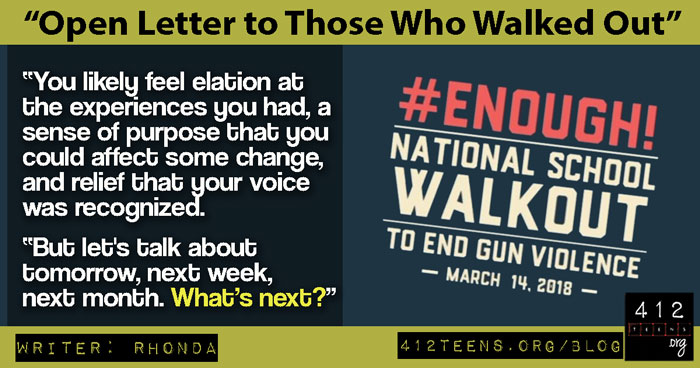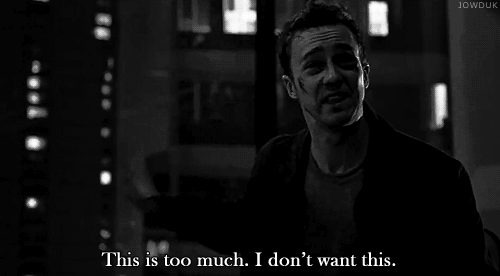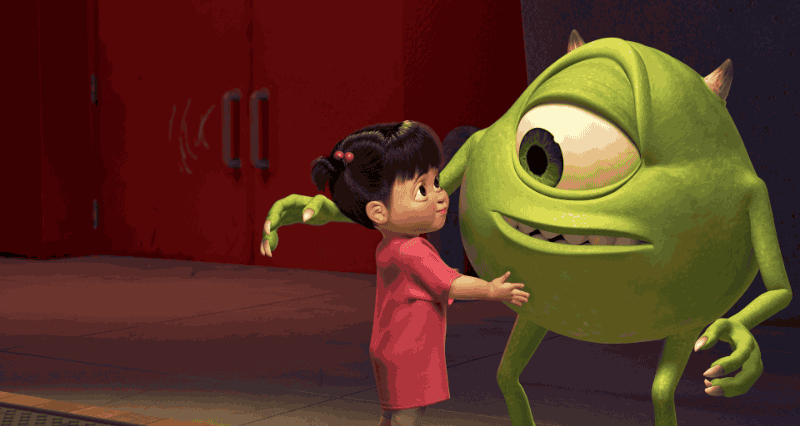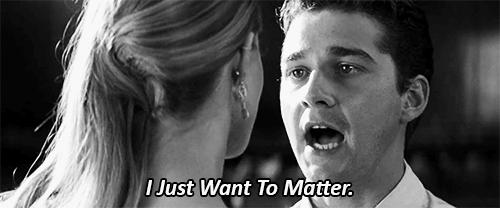An Open Letter to Students Who Walked-Out on March 14, 2018

Posted by Rhonda on 3-19-2018
First of all, may I just take a moment to tell you how proud I am of what you did last week on March 14, 2018? Fearing for the safety of your fellow students in public schools you stood up and demanded to be heard. At potential risk to yourselves, you proceeded with the course of action that you believed outweighed the risks of persecution or consequences.
In recent weeks, you have voiced concerns and suggestions for measures to improve the safety of every student on a national, state, and local level. You have demanded that the government fix serious issues and possible flaws in our laws—things that make it too likely for those with evil intent to harm a great number of others. You know there are no easy answers. No one thing is going to eliminate every risk of school violence, but you stood up, spoke up, and demanded to be heard—and I believe you were.
Today, you likely feel elation at the experiences you had, a sense of purpose that you could affect some change, and relief that your voice was recognized. But let's talk about tomorrow, next week, next month. What's next?
What can I do now?
We don’t have to be PhD historians to know that change takes time. We should not make light when we speak of reducing or restricting constitutionally-protected freedoms for good, law-abiding citizens. Certainly, there may be circumstances when restrictions might be appropriate, but I am not going to take a stand regarding gun laws in this letter. That isn’t what this letter is about. I have, however, been a part of something big in the past, only to find myself a little deflated afterward, asking myself, “NOW what do I do?”
Are you asking the same thing? Are you wondering, " What can I do NOW, while the elected officials in our communities, states, and country hammer out the legal issues? Is there something I can do today about the things that cause school violence?"
I think there IS something you can do today, and THAT is what this letter is about.
The Different Ones
The bullying culture of our day is staggering to comprehend. In every case of mass shootings at schools with student-aged perpetrators, those gunmen were once bullied, ostracized, and made outcasts of the schools they attended. Bullying doesn't stop at the end of the school day either. It reaches through the internet into the bedrooms of young, vulnerable, fragile people who believe they are the labels applied to them. Kids are ignored during school, then taunted online and even dared to kill themselves.
Kids and teens are still developing their brain patterns and psychological strategies as they grow and interact with the world. But many are subjected to more intense negativity and emotional trauma than they should be expected to handle.

The anonymity of social media presents the temptation to become people who hate (not disagree with or misunderstand but hate) anyone who does not look, think, or act like we do. Anyone who is "different."
Different equals scary in the world, and it always has. Different in appearance, ideas, speech, intelligence, or physical ability. And differences make people a target for bullying. We may not all overtly bully the "untouchables" of our schools and society, but we may very well avoid them. We have all done it. And avoidance, allowing someone to feel invisible, can be just as hurtful.
This is not about victim blaming, but it is about hitting a multi-faceted problem with a meaningful, multi-faceted approach. Laws are but one avenue to affect a nationwide epidemic of bullying and school violence. As individuals, we can affect lives on a personal level because all of us have been a part of "the different ones" at some point.
Jesus and the Different Ones
In Bible times, the Different Ones were called unclean and unworthy. But Jesus did not avoid those who were disdained by others. You don’t have to be a Christian to see that the historical Jesus had a radically different approach concerning people than did most of His contemporaries. In the early days of His ministry, as a new religious leader on the scene, conventional wisdom would have suggested that Jesus get in with the big guys, find a mentor who could help Him climb to great power, and avoid getting mired in the gritty grunt work of ministry to the needy.
But Jesus loved to do the opposite of what people expected him to do.
The Pharisees were the "big guns" of the Jewish religion in Jesus’ time—you might say they ran the popular crowd. But Jesus did not hang out with these men. In fact, He called them out on their hypocrisy and poor treatment of others, then turned around and did the opposite of what they would do. Jesus put Himself in among the Different Ones.

Jesus chose to hang out with recognized sinners, anyone who was willing to accept Him and the salvation He offered. He touched and healed the untouchable—lepers, the blind, the deaf, the lame, the mute, and those deemed unclean by the priests of the day. Jesus spoke with and taught women, something scandalous and unheard of back then! He even took time with children and highly valued them. He sought out the lonely, the marginalized, and the oppressed. Jesus offered the gift of grace and salvation to everyone—no matter what their circumstances. No one was beneath His notice, His help, or His very own life.
You and the Different Ones
What can we take from the example of a man willing to endure public scorn and ultimately death on a cross for His radical idea that everyone was worthy of love—not just the seemingly righteous? I think we start with some soul searching.
How do WE treat others? Is it enough that we aren’t actively bullying or inflicting pain on the vulnerable, the invisible, the untouchable? What would happen if we sought out those who are ignored or hurt by the rest? What if we tried to embrace differences rather than fear them? What would that look like in the long term? Would we intervene when we witnessed bullying? Would we risk the ridicule of our peers if we befriended someone others avoided? Would we stop seeing others as "different" and learn to appreciate the uniqueness in every single person?
I don’t know what the answers might be for you. But if you wake up tomorrow feeling a little deflated, feeling a little helpless, feeling somewhat impotent against this huge problem, then maybe consider a challenge: Look up. Look around. Do you see him? Do you see her? You don’t have to make a grand gesture. Start by simply noticing.

Who are they? Do they have any friends? What are their interests? What do you have in common? How do their school or life experiences differ from your own? How can you enrich their lives with the love of Christ?
Learn their names. Say hello in the hallways. Ask them about homework assignments. Show them that you see them. That they matter. That they DO actually exist. And BE GENIUNE. All these actions are for nothing without love. (See 1 Corinthians 13.) Do your best to be a good friend to someone who could benefit from an honest friendship.
Change Begins with One
Sometimes change happens from the top down. A new queen is crowned, and suddenly that country’s religion and ways of living are drastically changed. More often, though, change starts at the bottom. And movement, almost always, begins with ONE. One person makes a slight change. Their peers may ridicule them for daring to believe such a small change would make a difference.
But there are usually a couple people in the wings, watching, considering the actions of the ONE, and willing themselves to have the same kind of courage. They may venture out and join the One and then there are Two, then Three...
This how revolutions are started. One person steps away from the crowd and introduces a new concept. A new way of doing things. A new way of treating others. That's what Jesus did in His day. Today, we need this in our schools.
We need you to start or join the revolution that refuses to marginalize others. Refuses to ignore. Refuses to hate. Commits to kindness and compassion. Commits to love.
You can be that ONE.
—Rhonda


Writer: Rhonda Maydwell
Rhonda is an author, wife, mother, and mentor. She graduated from the University of Missouri with a degree in English and Religious studies. She loves studying God’s Word for truth and wisdom and uses it as a compass and roadmap for her own spiritual journey. Rhonda believes in sharing the Good News and the hope found in biblical truths with others. She uses her writing and mentoring opportunities (often with a pinch of humor) to do just that.
